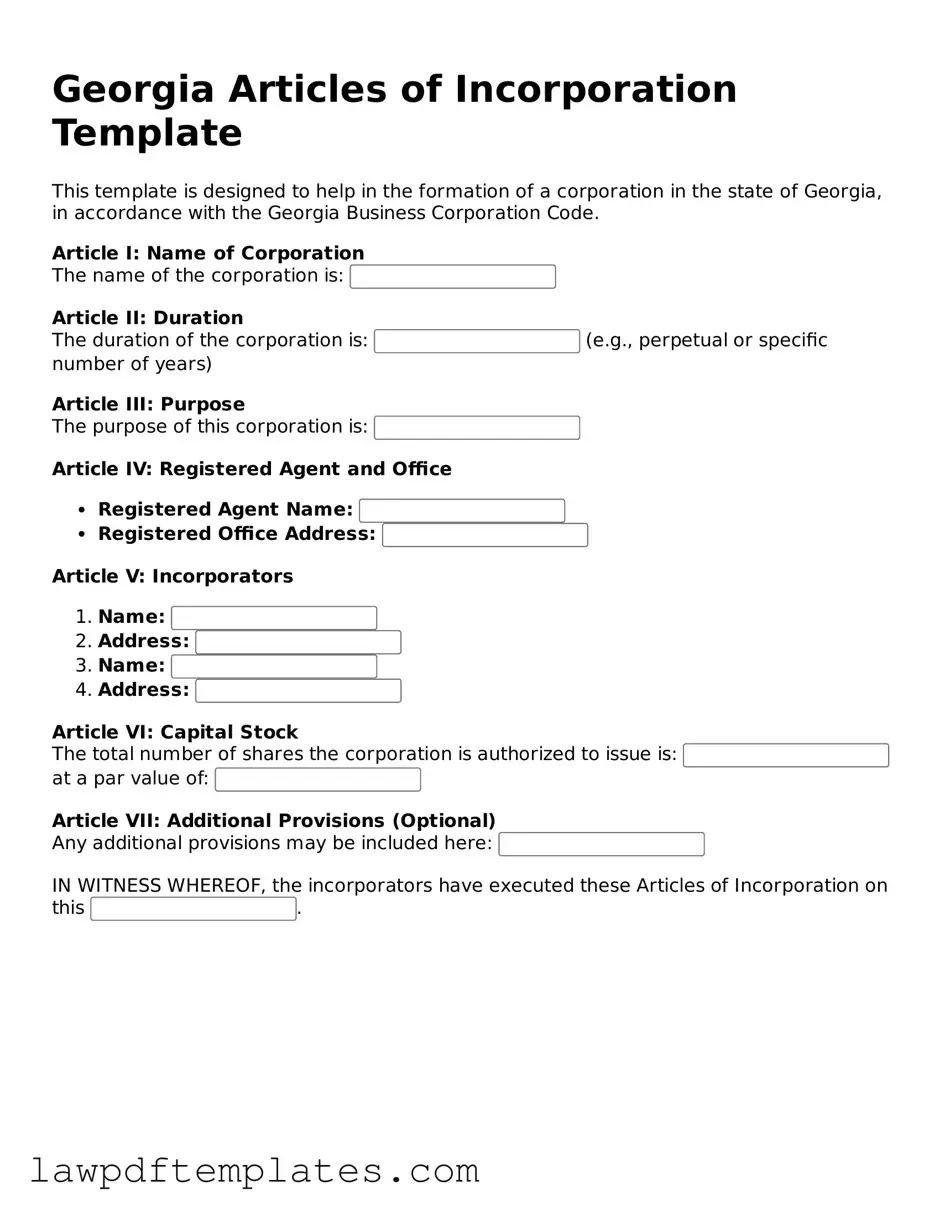Free Articles of Incorporation Template for the State of Georgia
Form Breakdown
| Fact Name | Description |
|---|---|
| Purpose | The Georgia Articles of Incorporation form is used to legally create a corporation in the state of Georgia. |
| Governing Law | This form is governed by the Georgia Business Corporation Code, specifically O.C.G.A. Title 14, Chapter 2. |
| Filing Fee | A filing fee is required when submitting the Articles of Incorporation, which is currently set at $100. |
| Required Information | The form requires essential details, including the corporation's name, registered agent, and the number of shares authorized. |
| Registered Agent | A registered agent must be designated, who will receive legal documents on behalf of the corporation. |
| Incorporator | At least one incorporator must sign the Articles, and this person can be an individual or a business entity. |
| Effective Date | The Articles can specify an effective date, which may be the filing date or a future date of the incorporator’s choosing. |
| Amendments | Changes to the Articles of Incorporation can be made through an amendment process, which also requires filing with the state. |
| Public Record | Once filed, the Articles of Incorporation become part of the public record and are accessible to anyone interested. |
Sample - Georgia Articles of Incorporation Form
Georgia Articles of Incorporation Template
This template is designed to help in the formation of a corporation in the state of Georgia, in accordance with the Georgia Business Corporation Code.
Article I: Name of Corporation
The name of the corporation is:
Article II: Duration
The duration of the corporation is: (e.g., perpetual or specific number of years)
Article III: Purpose
The purpose of this corporation is:
Article IV: Registered Agent and Office
- Registered Agent Name:
- Registered Office Address:
Article V: Incorporators
- Name:
- Address:
- Name:
- Address:
Article VI: Capital Stock
The total number of shares the corporation is authorized to issue is: at a par value of:
Article VII: Additional Provisions (Optional)
Any additional provisions may be included here:
IN WITNESS WHEREOF, the incorporators have executed these Articles of Incorporation on this .
Common mistakes
Filing the Articles of Incorporation in Georgia is a crucial step for anyone looking to establish a corporation. However, several common mistakes can lead to delays or complications. Understanding these pitfalls can help ensure a smoother process.
One frequent error involves providing incomplete information. Each section of the form requires specific details, such as the name of the corporation and the registered agent. Omitting any required information can result in rejection of the application.
Another mistake is failing to choose a unique name for the corporation. The name must not only comply with state regulations but also be distinct from existing businesses. Conducting a thorough name search before submission can prevent potential conflicts.
Many individuals overlook the importance of specifying the corporation's purpose. While a general statement may suffice, being too vague can lead to questions from the state. Clearly defining the business activities helps in establishing the corporation’s intent.
Incorrectly identifying the registered agent is another common issue. The registered agent must be a person or business entity authorized to conduct business in Georgia. Providing inaccurate information about the agent can complicate legal notifications and communications.
Some applicants fail to include the required signatures. The form must be signed by the incorporators, and missing signatures can halt the processing of the application. Ensuring all necessary parties sign before submission is essential.
Another mistake involves misunderstanding the filing fee. Applicants must submit the correct fee along with the form. Failing to include the appropriate payment can lead to delays or rejection of the filing.
Finally, individuals sometimes neglect to review the completed form for errors. Simple typos or inaccuracies can lead to complications. Taking the time to double-check all information can save time and prevent future issues.
Discover More Articles of Incorporation Templates for Specific States
How Do I Get a Certificate of Good Standing - The form may specify the duration of the corporation's existence.
Incorporate Nc - This document outlines the basic details of your business entity.
Completing the Trader Joe's application form is crucial for those looking to secure a position at this beloved grocery store, and it can be easily accessed through platforms like PDF Documents Hub, where you can find all the necessary resources to assist you in your application process.
Llc Michigan Online - The Articles can help in ensuring compliance with state corporate laws.
Ca Business Registration - Details the location of the corporation's headquarters.
